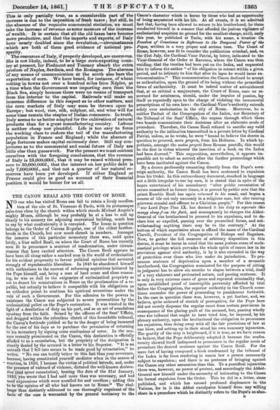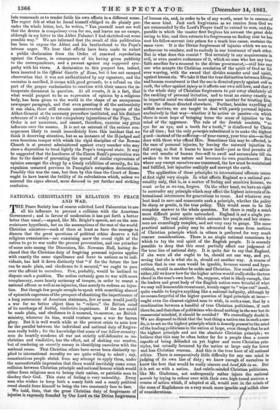THE CANON REALI AND THE COURT OF ROME.
NO one who has visited Rome can fail to retain a lively recollec- tion of the site of St. Vincenzo di Paolo, with its picturesque palm-tree close by the church within which stands Michael Angelo's mighty Moses, although he may probably be at a loss to call up clearly to his memory the adjoining conventual building, much less to say by what confraternity it is occupied. The house in question belongs to the Order of Canons Regular, one of the oldest brother. hoods in the Church, but now much shrunk in numbers. Amongst the inmates of this particular monastery there was, until quite lately, a friar called Reali, on whom the Court of Rome has recently seen fit to pronounce a sentence of condemnation, under circum- stances that have excited attention. The Canon Reali appears to have been all along rather a marked man in the world of ecclesiastics for his evident propensity to favour political opinions that savoured strongly of reprehensible liberalism. In 1848 he abandoned himself with enthusiasm to the current of reforming aspirations initiated by the Pope himself, and, being a man of hard sense and close reason- ing, he was so didl to the exigencies of ecclesiastical propriety as not to desert his ministrations in Rome on the proclamation of a re- public, but actually to believe it compatible with his obligations as an orthodox priest to continue his spiritual avocations under the rule of such a Government. For this adhesion to the powers in existence the Canon was subjected to severe persecutions by the ecclesiastical police on the Pope's restoration. It was treated in the light of a dereliction of duty on his pari, and as an act of scandalous apostasy from the faith. Seized by the officers of the Sant' Uffizio, and dragged within the relentless clutch of this formidable tribunal, the Canon's fortitude yielded so far to the danger of being immured for the rest of his days as to purchase the permission of returning to his monastery by signing some confessions of error. In the cen- sure recently pronounced on the Canon, this declaration is officially alluded to as a recantation, but the propriety of the designation is stoutly denied by the accused in a letter to his Superior. "It is an untruth that I fell into errors to be made good by retractation," he writes. "No one can testify better to this fact than your reverence, because, having constituted yourself mediator when in the season of reaction, in 18b0, I became the victim of political hatreds, and, under the pressure of unheard of violence, dictated the well-known declara- tion (and never recantation), bearing the date of the 21st January, 1850, you wrote that I had said more than was necessary, and had used expressions which were uncalled for and needless ; adding this to be the opinion of all who had known me in Rome." The chal- lenge thus distinctly addressed to one thoroughly cognizant of the facts of the case is warranted by the general testimony to the Canon's character which is borne by those who had an opportunity of being acquainted with his life. At all events, it is an admitted fact that, having been allowed to return to his brotherhood, he there conducted himself in a manner that afforded the jealous vigilance of ecclesiastical suspicion no ground for the smallest charge, until, early this year, he published at Turin, with his name, a treatise Ox Freedom of Conscience in Reference to the Temporal Power of the Popes, written in a very proper and serious tone. The Court of Rome, however, saw fit to consider the publication criminal, and, on the 21st July, the Cardinal-Vicar Patrizi, by letter, intimated to the Vicar-General of the Order at Ravenna, where the Canon was then residing, that the treatise had been put on the Index, and requested him to inform the author " of his obligation to retract within a given period, and to intimate to him that after its lapse he would incur ex- communication." This communication the Canon declined to accept as authoritative, upon the ground of its being without the prescribed forms of authenticity. It mast be indeed matter of astonishment that, at so critical a conjuncture, the Court of Rome, once so re- nowned for astuteness, should, under the impulse of passion, lay itself so repeatedly open to the charge of violating the immemorial prescriptions of its own laws : the Cardinal-Vicar's authority extends solely over ecclesiastics in the city of Rome. Moreover, he is neither Prefect of the Congregation of the Index, nor Secretary of the Tribunal of the Sant' Uffizio, the organs through which these two boards communicate their decisions after an elaborate mode of procedure. Therefore, the Canon Reali refused to ascribe any valid authority to the intimation transmitted in a private letter by Cardinal Patrizi, unless, as he wrote, he were "bound to believe the decree in question to proceed, snafu proprio, from his Holiness. In which hy- pothesis, amongst the molar proprii from Roman pontiffs, this would be the first in virtue whereof the insertion of a book on the Index had been decreed." This supposition, nevertheless, it appears im- possible not to admit as correct after the farther proceedings which have been instituted against the Canon.
By a decree professedly emanating directly from the Pope's sove- reign authority, the Canon Reali has been sentenced to expulsion from his Order. In this extraordinary document, couched in language not a little irregular to our lay ears, it is stated that in spite of the hopes entertained of his amendment "after public recantation of errors committed in former times, it is proved by public acts that the priest Busebio Reali has again returned to his vomit, and begun a course of life not only unseemly in a religious man, but also causing grievous scandal and offence to a Christian people." For this reason "our Lord Pope Pius IX. has deemed it his duty to separate this mangy sheepflom the flock, and consequently he charges the Abbot- General of the brotherhood to proceed to his expulsion, and to de- clare him so expelled, passing over the prescribed forms, and not- withstanding anything there may be to the contrary." At the bottom of which superlative ukase is affixed the name of the Cardinal Clarelli, President of the Congregation of Bishops and Regulars. Now, to gather the full measure of arbitrary disposition in this decree, it must be borne in mind that the same jealous sense of eccle- siastical privilege which pervades the whole spirit of canon law in its provisions against civil authority, is by it also extended iu the way of protection over those who live under its jurisdiction. To pro- nounce sentence of deprivation upon a member of a monastic brotherhood, the Congregation nominated for the purpose of sitting in judgment has to allow six months to elapse between a trial, itself of a very elaborate and protracted nature, and passing sentence. It is only in very extreme cases of gross and repeated criminality that, upon established proof of incorrigible perversity afforded by trial before the Congregation, the superior authority in the Church some- times concedes the power of proceeding to punishment forthwith. In the case in question there was, however, a yet further, and, we believe, quite unheard of stretch of prerogative, for the Pope here did not merely dispense the regular court from certain provisions in consequence of the glaring guilt of the accused, but, passing wholly over the tribunal that ought to have tried him, he imposed, by his plenary authority, upon the brotherhood the obligation to pronounce his expulsion, thus doing away with all the fair provisions of law at one blow, and setting up in their stead his own summary injunction. The gravity of the step is heightened, if it is true, as we have reason to believe, that the Pope deliberately adopted it because the confra- ternity showed itself indisposed to pronounce in the regular mode of procedure the desired sentence against the Canon Reali. For the mere fact of having composed a book condemned by the tribunal of the Index is far from rendering in canon law a person necessarily subject to expulsion; and there is no pretence of bringing against the Canon any other accusation than this. To a pontifical injunction there was, however, no power of protest, and accordingly the Abbot- General saw himself under the necessity of intimating to the Canon his formal expulsion from the Order. This lie did in a letter, since published, and which has caused profound displeasure in the Vatican, for in it the Abbot exculpates himself from any willing share in a procedure which he distinctly refers to the Pope's so abso- lute commands as to render futile his own efforts in a different sense. The regret felt at what he found himself obliged to. do plainly per- vades the whole letter, but, he writes, "You yourself must see well that the decree is compulsory even for me, and leaves me no escape, although in my letter to the Abbot Palmieri I had sketched out some possible way." We are informed that the result of this publication has been to expose the Abbot and his brotherhood to the Pope's intense anger. We hear that efforts have been made to extort a public 'declaration from the Order of renewed reprobation against the Canon, in consequence of his having given publicity to the correspondence, and a protest against any supposed sym- pathy with his views. A declaration to this purport has, indeed, been inserted in the Official Gazette of Rome, but it has not escaped observation that it was not authenticated by any signature, and the omission is ascribed, it seems with good grounds, to a refusal on the part of the proper ecclesiastics to sanction with their names the in- temperate document in question. At all events, it is a fact, that what would purport to be an expression of opinion by a religious body, has been given to the world in the shape of an anonymous newspaper paragraph, and that even granting it all the authenticity it can claim, there still remain uncontroverted the regrets of the Abbot-General at the summary procedure instituted, and his distinct reference of it solely to the compulsory injunctions of the Pope. The Order is not 'numerous, and cannot, therefore, exercise any great influence over the masses. It is not on account of the serious con- sequences likely to result immediately from this incident that we think it deserving attention, but as an instance of the ill-judged and even ferocious temper with which the rigid discipline of the Roman Church is at present administered against every member who may show a disposition to treat lightly the Pope's temporal state. It may be suggested that the harshness of the Canon RealPs prosecution was due to the desire of preventing the spread of similar expressions of opinion amongst the clergy by a timely exhibition of severity, for his expulsion occurred previous to Passaglia's outspoken declarations. Possibly this was the case, but then by this time the Court of Rome ought to have learnt the futility of its calculations which, unless we misread the signs abroad, seem doomed to yet further and striking confusion.































 Previous page
Previous page